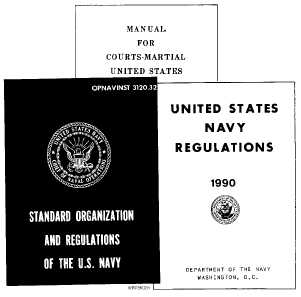2-4
involving enlisted personnel starts in town, you must
help in quieting the disturbance, whether an officer is
present or not. If you face such a situation and you do
your job to the best of your ability, you can be proud.
If an enlisted person violates a regulation in the
presence of both an officer and a petty officer, the petty
officer should correct the person. Failing to correct the
person could result in a reprimand for the petty officer.
Figure 2-1 shows three official sources for basic
disciplinary laws. The UCMJ is an appendix of the
Manual for Courts-Martial.
Figure 2-1.—Three official sources for basic disciplinary laws.
The best form of discipline is positive action geared
to prevent disciplinary problems before they happen.
Effective leaders use that type of discipline to help
persons understand the need for regulations and the need
to abide by them. To receive loyalty and willing
obedience from those under you, you must set an
example of high personal standards and moral conduct.
In setting a proper example for your people, how can
you report somebody for being out of uniform if you
show up at muster looking like you have slept in your
uniform for 3 days? If you show up late for muster,
reporting one of your people for showing up late would
be unfair. So, you must set the example and maintain the
highest standards for your people to follow. Remember,
the way you act is also the way your people will act.
Each time a petty officer helps a shipmate keep a
clean record, that PO is living up to the highest
traditions of the Navy. Except for major infractions of
the UCMJ, putting people on report should be done only
as a last resort. You always should try other methods of
correction—appeal to pride, disapproval of special
requests (which emphasizes that approval of special
requests is for the more deserving), encourage team
spirit, and so forth—first. Only after you try other
methods of correction and those fail should you place an
enlisted person on report for a minor offense.
The Navy has personnel of high caliber who can be
trusted and who do their work well. However, many of
them will at some time commit an infraction, such as
accidentally being out of uniform, being a couple of
minutes late to quarters, or failing to salute an officer.
You would be unwise to place people on report for
trivial offenses. You should use initiative and common
sense to help keep them out of trouble. Repeatedly
putting persons on report for minor infractions reflects
on your leadership ability, and you will soon find
yourself heartily disliked by personnel under you. On the
other hand, the "good guy" who tries to maintain
popularity and never reports a person is a menace to
discipline and a nuisance to all petty officers.
Report of Offense Processing
In spite of your best efforts and those of the division
officer, some personnel will be, among other things,
insubordinate, indifferent to wearing the proper uniform,
and lax in relieving watches on time. Some also will
malinger or fight. Those are the people who must be put
on report, unpleasant though it may be. All you are
doing is reporting to the commanding officer a violation
of military order or discipline; the captain decides
whether to punish the person.
Placing a person on report (starting a charge against
the individual) means letting the proper authority (CO,
XO, CDO, OOD, legal officer, military police, security
or MAA force, or any superior in the chain of command)
know about the apparent misconduct. Your notification
can be oral or in the form of a written report chit. If your
command has a locally prepared report chit, you should
use that form; otherwise, you can use the standard Navy
report chit, Report and Disposition of Offense(s),
NAVPERS 1626/7, as shown in figure 2-2. Whichever
form you use, make your report as complete, accurate,
and specific as possible.


